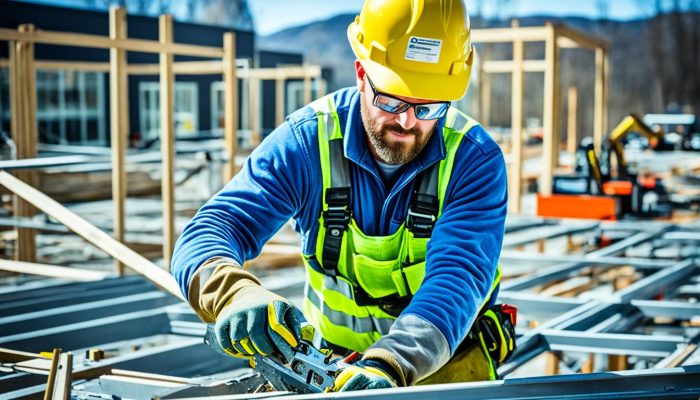The home buying process is both exciting and a bit scary. It starts with getting mortgage pre-approval and ends with closing the deal. Knowing each step is key to feeling confident. Let’s look at the main steps: mortgage pre-approval, house hunting, home inspection, and closing costs.
Key Takeaways:
- The home buying process involves several essential steps.
- Mortgage pre-approval is the first step to determine your budget.
- House hunting is all about finding the perfect home that meets your needs.
- A thorough home inspection ensures you make an informed decision.
- Understanding closing costs helps you budget for the final stage of the process.
Step 1: Mortgage Pre-Approval
Before you start looking for a house, getting mortgage pre-approval is key. This step makes buying a home smoother and helps you know your budget. It also shows what options you have.
Applying for mortgage pre-approval means you’ll talk to a lender about your finances. They’ll look at your credit score, income, and how much debt you have. This helps figure out how much you can borrow and the interest rate you’ll get.
Remember, mortgage rates can differ between lenders. So, it’s smart to compare rates from various lenders. This way, you can find the best rate for your situation.
Also, having a down payment ready is crucial for pre-approval. A down payment is part of the home’s price you pay upfront. It shows you’re serious and financially stable. The amount needed varies based on the mortgage type and lender rules.
Going through the mortgage pre-approval process gives you a clear idea of what you can afford. It lets you confidently look for your dream home within your budget. This important step is the foundation of a successful home buying journey.
If you’re curious about how your personal info is handled when applying for mortgage pre-approval, check out caychuoicanh.com. It explains how your data is collected, used, and kept safe. Knowing your rights and the security measures in place can ease your mind during the pre-approval process.
With your mortgage pre-approval in hand, you’re ready to start house hunting.
Step 2: House Hunting
After getting pre-approved for a mortgage, it’s time to start looking for a house. This step is exciting, letting you see different properties and imagine your future home. It’s a chance to explore and find the perfect place for you.
House hunting can feel both exciting and a bit scary. It’s important to know what you want in a home. Think about things like location, size, layout, and how close it is to schools or parks. These are important for you and your family.
A real estate agent can be a big help during this time. They know about many houses and can pick ones that fit what you’re looking for. Whether you want a cozy home in the suburbs, a modern city loft, or a big country house, they can find it for you.
Working with a real estate agent has many benefits. They set up viewings so you can see houses you like up close. This lets you get a feel for the house’s layout and how it feels. It’s a chance to picture yourself living there and see if it fits your life.
Also, a real estate agent can give you advice and insights. They know the local housing market well and can guide you through negotiations. Their knowledge helps you make smart choices and get a good deal.
House hunting isn’t a competition. Take your time, see many houses, and compare them. Each house you look at teaches you more about what you want. Don’t hesitate to ask questions or get more info to fully understand a property.
As you look at houses, keep track of your thoughts and feelings. Use a journal or checklist to note what you like and any worries you have. This helps you compare houses better and choose the right one for you.
“House hunting can be a thrilling adventure. It’s the process of searching for your dream home and finding a place where you can create lasting memories with your loved ones.”
The goal of house hunting is to find a home that fits your needs, likes, and dreams. A real estate agent can make this easier and more fun. So, get ready to explore, discover, and find a home that makes you happy and fulfilled.
Continue to CayChuoiCanh.com for more info on banana plants, how to plant them, and how to take care of them.
Step 3: Home Inspection
Before buying your dream home, make sure to get a thorough home inspection done. This step is crucial. A home inspection checks the property’s condition, including its structure, electrical systems, and plumbing.
An inspector looks at the house’s parts and finds any issues or potential problems. These could be structural damage, bad wiring, leaks, or mold. Finding these problems early helps you decide if you want to buy the house or talk about repairs with the seller.
Choosing a good inspector is key. Ask your real estate agent for advice or look up reviews online. Make sure the inspector is certified by groups like the American Society of Home Inspectors (ASHI) or the International Association of Certified Home Inspectors (InterNACHI).
Benefits of a Home Inspection
A detailed home inspection offers many benefits to buyers:
- Identifying potential issues: It shows you the property’s true condition, revealing hidden defects you might not see otherwise.
- Negotiating repairs or price adjustments: If the inspection finds big problems, you can ask the seller to fix them or lower the price.
- Planning for future maintenance: Knowing the property’s current state helps you plan for repairs or maintenance later, so you can budget for them.
- Peace of mind: A thorough inspection gives you peace of mind, knowing you’ve made an informed choice and understand any risks or repairs needed.
A home inspection is not the same as an appraisal. An appraisal values the property, while an inspection checks its condition. Both are important to know the property’s worth and its state.
Being there during the home inspection is key. It lets you ask questions, get more information, and see problems for yourself. You can talk about solutions with the inspector too.
With a professional home inspection, you can make a smart choice about the property. This gives you confidence in your decision to buy.
Step 4: Closing Costs
As you near the end of buying a home, know about the closing costs. These are extra fees you must plan for. They vary by location and loan type, but there are common ones to expect.
One common cost is an escrow account. This is a special account that holds funds until the deal is done. It protects everyone involved in the deal, making sure funds are given out right.
Another cost is title insurance. It protects the buyer and lender from title issues. This ensures you own the property and keeps your investment safe.
For accurate closing costs, talk to your lender or real estate agent. They’ll give you a full list of fees, like attorney and appraisal fees, based on your situation.
Review and compare closing cost estimates from different lenders. This helps you plan your budget and get ready for closing.
Step 5: Closing the Deal
Congratulations! You’ve reached the final step of buying a home. This is an exciting time as you’re about to own your dream home. There are a few important tasks to complete for a smooth transition.
First, you’ll need to review and sign all the necessary paperwork. This includes the sales agreement, loan documents, and legal documents. Make sure you understand the terms and conditions before signing.
Pay special attention to closing costs. These are fees and expenses for finalizing the sale. Closing costs can include appraisal fees, title search fees, and more. It’s important to know about these costs and have the funds ready.
For transferring ownership, work with a reputable title company or attorney. They will make sure all legal transfers and documentation are done right.
At the closing, you’ll pay for the closing costs. This can be done by wire transfer or certified check. Plan ahead and have the funds ready to avoid delays.
After signing the paperwork, paying the closing costs, and transferring the title, you can celebrate your new home! Take time to appreciate your hard work and the joy of finding your dream home.
Now that you’re a homeowner, it’s time to settle in. Decorate, renovate, or just enjoy your space. This is the start of an exciting chapter in your life.
The home buying process can be overwhelming, but with the right guidance, it’s rewarding. Understanding each step, including closing the deal, helps you navigate with confidence and make informed decisions.
Conclusion
After going through the home buying process, you’re closer to getting your dream home. Getting mortgage pre-approval to closing the deal was key. Each step helped make owning a home possible.
It’s important to stay organized and proactive. Always ask questions and get advice from experts for a smooth process. You’re not alone, and there are professionals ready to help you.
Congratulations on starting this exciting journey. Your dream home is close, and with the right knowledge and support, you’ll soon open the doors to your new home. Good luck with the rest of your home buying journey!
FAQ
What is the first step in the home buying process?
The first step is getting mortgage pre-approval. You meet with a lender to see how much you can borrow and your interest rate.
How does mortgage pre-approval work?
You share your financial info with a lender. They check your credit score, income, and debt-to-income ratio. Then, they tell you how much you can borrow and your interest rate.
Why is it important to shop around for mortgage rates?
Shopping for mortgage rates lets you compare offers from different lenders. This way, you can find the best rate and terms, saving you money over time.
What is the role of a real estate agent in the home buying process?
A real estate agent helps a lot in finding your dream home. They show you listings that fit your needs, set up viewings, and help with negotiations.
Why is a home inspection important?
A home inspection finds any issues or repairs needed in the home. It gives you important info before buying, helping you avoid surprise costs later.
What are closing costs?
Closing costs are fees for finalizing your home purchase. They cover things like attorney fees, appraisal fees, title insurance, and escrow accounts.
How do I prepare for closing costs?
Plan for closing costs by adding them to your home buying budget. Your lender or real estate agent can tell you what costs to expect.
What happens during the closing of a home purchase?
At closing, you sign papers, pay closing costs, and officially own the property. Always review documents carefully and ask questions before signing.
How can I navigate the home buying process successfully?
To succeed, know the steps, work with experts like lenders and real estate agents, stay organized, ask questions, and be proactive.
What should I do after closing the deal?
After closing, celebrate your new home! Make sure you have all your documents and set up utilities and change your address.



